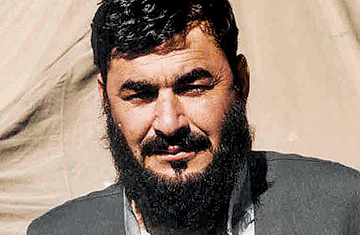
Bashir Noorzai, an Afghan who is on the United States' list of most wanted drug kingpins.
(7 of 8)
In New York City, Noorzai says, he thought everything was going well--up until the point that he was arrested. He says he wasn't bothered that the U.S. agents had taken away his cell phone. Or that they had told his friend Babar, the former ISI colonel who accompanied him to Manhattan, that Noorzai was "not being cooperative." Noorzai thought it was curious that each day, when the interrogations began, the agents would read him his rights. He says he had no idea why his interrogators kept saying he had a right to counsel and the right to remain silent. One official with knowledge of the case against Noorzai told TIME that he was "lured" to the U.S., implying that the goal the entire time had been simple: get him to New York City in order to arrest him. This suggests that all the meetings in 2004 had been part of a grand deception, designed to convince him that he was being looked at as a political asset and not as a potential criminal detainee. The idea is that by the time he got to New York, the jig was up, and the feds were just trying to wring every last bit out of him before the arrest.
But could it be that senior officials in Washington were still debating whether Noorzai was an intelligence asset worth preserving? "It is conceivable," says a former intelligence analyst, "that he could have provided a stabilizing role in the south." Many questions remain unanswered about the conversations that took place among DEA, FBI and DIA officials who dealt with him. Two sources have hinted at tensions among the agencies but decline to explain when and how these were resolved. As a former senior DEA official put it, "It was a very, very sensitive case."
Even if Noorzai wasn't fully reliable, it's fair to ask why his offer wasn't taken up. Washington may have scored a public victory in the war on drugs with his arrest. But some officials in Kabul and Washington now quietly wonder whether giving him a shot at what he said he could deliver--the allegiance of his tribe--might have been the smarter option. The government has not said that his arrest will diminish the heroin trade in Afghanistan. Indeed, the war against drugs and the war against the Taliban have to be seen as a single conflict--not separate objectives. "All of a piece," says a senior Western diplomat. "You can't separate narcotics from security from governance."
In Afghanistan, a weak government has produced a security vacuum that in turn inhibits economic development and diversification, forcing impoverished farmers to grow lucrative crops like the opium poppy for cash. Any deliberate crop destruction carried out by the Afghan government often drives poor farmers to sympathize with the insurgency. Just two weeks ago, despite international pressure, President Karzai said Afghanistan would not carry out chemical spraying of poppy crops, given the intense level of opposition among farmers.
